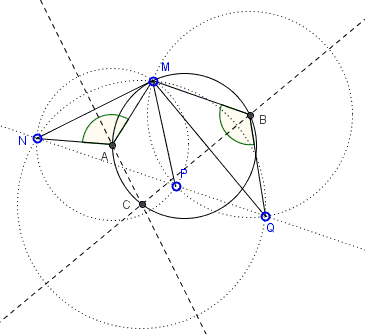Three Collinear and Four Concyclic Points
The problem below is a part of a question posted at the CutTheKnotMath facebook page by Cõ Gẫng Lên:
Points \(N, P, Q\) are collinear. For a fourth point \(M,\) consider circumcircles, \((A)\) of \(\Delta MNP\), \((B)\) of \(\Delta MPQ\), \((C)\) of \(\Delta NPQ.\)

Prove that points \(M, A, B, C\) are concyclic.
(The applet below illustrates the problem.)
|Contact| |Front page| |Content| |Geometry|
Copyright © 1996-2018 Alexander Bogomolny
Points \(N, P, Q\) are collinear. For a fourth point \(M,\) consider circumcircles, \((A)\) of \(\Delta MNP\), \((B)\) of \(\Delta MPQ\), \((C)\) of \(\Delta NPQ.\)

Prove that points \(M, A, B, C\) are concyclic.
Solution
For definiteness sake, let point \(P\) lie between \(N\) and \(Q\). Angles \(NPM\) and \(MPQ\) are supplementary: \(\angle NPM=180^{\circ}-\angle MPQ.\) \(\angle NPM\) is inscribed in circle \((A)\) so that central angle \(NAM\) is twice as large. In circle \((B)\), \(\angle MBQ=2(180^{\circ}-\angle MPQ)=\angle NAM.\) It follows that two isosceles triangles \(AMN\) and \(BMQ\) are similar. In addition, one can be obtained from the other by a rotation around \(M\) followed, if necessary, by a homothety with center \(M\).

Under the two trasformations the perpensicular bisector of \(MN\) maps onto the perpendicular bisector of \(MQ.\) Let \(C'\) be the point of intersection of the two bisectors: \(C'N=C'M=C'Q,\) implying \(C'=C.\) Also, since \(C\) is defined by a rotation around \(M\), and \(MA\) is mapped onto \(MB,\) \(\angle AMB+\angle ACB=180^{\circ},\) making the four points \(M,A,B,C\) concyclic.
In a little different guise and with a different proof the problem appears elsewhere
|Contact| |Front page| |Content| |Geometry|
Copyright © 1996-2018 Alexander Bogomolny
73735583
